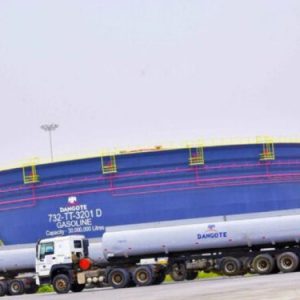Once upon a time, President Olusegun Obasanjo initiated a policy that revolutionised Nigeria’s cement industry, making the nation a net exporter.
It was in 2002. President Olusegun Obasanjo assembled business leaders and challenged them to make efforts to end cement imports into Nigeria.
Aliko Dangote, Africa’s richest man, was in the room. Other business leaders were also in that room.

The policy was simple: Unless you set up a local cement plant, you would not be allowed to import.
Nigeria’s population was rapidly growing and it was becoming clear that cement demand would be rising. With a rising population growing at over two percent per annum, it was clear that infrastructure gap would further widen.
Dangote, once an importer, took up the challenge. Between 2006 and 2007, he set up local plants while Lafarge expanded. The likes of Unicem and Cement Company of Northern Nigeria (CCNN) came on board later to chase market share. In December 2018, CCNN merged with BUA’s Kalambaina plant in Sokoto, North-West Nigeria.
“And now, also, Nigeria is the largest exporter of cement in Africa,” Dangote re-told the story during a high-level conversation entitled, ‘The Path to Making Africa Great Again’ with CNN’s Eleni Giokos at the Afreximbank Annual Meetings on Friday.
“When we finish our factory, it’s 100 percent for export. And Nigeria will not earn less than $500 million of just exporting cement,” he said.
“President Obasanjo called me at 4:30 in the morning and said, ‘Aliko, Nigeria is number two in cement imports. I’m not going to allow this to continue. What do we do?’ I told him, remove my Dangote cap and let me speak for Nigeria.”
“All of us now wanted to set up industries. We were small at the time, but our bankers were supportive,” he said.
“We built a five-million-ton plant while Nigeria was producing 31.9 million tonnes. Today, Nigeria produces over 60 million tonnes of cement.”
Dangote also underscored that job creation and economic value cannot be achieved if Africa remains a dumping ground for foreign goods. “If we continue to import, we’re importing poverty and exporting jobs. We must process our minerals before exporting them to create employment,” he said.
Referencing U.S. President Donald Trump’s ‘America First’ policy, he stressed that African countries must adopt a similar mindset. “President Trump is saying ‘America First.’ We should also say ‘Africa First.’ The issue is that once you open your market without capacity, it becomes a dumping ground. That’s not fair competition. That’s dumping.”
He criticised the tendency of African elite to expatriate their wealth. “In Asia, whether people make their money legally or illegally, they invest it at home. In Africa, they take the money out. If I don’t invest at home, how do I convince someone else to partner with me?”
Dangote also called attention to the challenges facing industrialisation in Africa. “Two things don’t allow industries to thrive in Africa: lack of electricity and inconsistency in government policies.” He urged governments to take bold decisions like Obasanjo’s. “That policy changed everything. Today, Nigeria doesn’t import cement. It exports itand earns foreign exchange.”
In addition to cement, Dangote noted Nigeria’s growing success in the export of refined products and fertiliser. “We’re exporting jet fuel to Asia and the United States. In fact, 37 percent of our fertiliser goes to the U.S. That shows what can be done.”
He described the Dangote Refinery as a ‘madness project’ but affirmed its worth. “If we knew what we were going to go through, we wouldn’t have done it. But we didn’t know, and we’ve delivered. It was humongous, and without the support of banks like Afreximbank, Access, and First Bank, it would not have been possible.”
Dangote acknowledged current challenges, particularly access to local crude. “But we African champions must understand that we’re the only ones who can make Africa great. No one will do it for us.”
He expressed frustration at Africa’s constant pursuit of foreign investors. “Foreign investors don’t just come. Support domestic investors first. When they do well, it invites foreign capital.”
On geopolitical dynamics, he questioned why Africans should struggle to get U.S. visas. “Why go to the U.S.? They should come here. We have 60 percent of the world’s arable land and almost all critical minerals. Don’t take our cocoa, process it there, then sell chocolate back to us at 20 times the price.”
He called for bold thinking. “Think big, and you’ll grow big. Think small, you’ll stay small. Let’s stop making Africa a charity case.”
Ambitious pledge
Dangote also made an ambitious pledge. “In the next 40 months, Africa will not import fertiliser. We’re on an aggressive trajectory. We’re building the largest urea plant, bigger than Qatar’s.”
He responded to concerns about Africa’s trade finance gap, describing institutions like Afreximbank and the Africa Finance Corporation as essential. “If I had to invest in any bank, even without profit, I’d choose one that shares the same vision as Afreximbank. That’s how we build Africa.”
Dangote reiterated, “We need strong financial institutions, a manufacturing base, and to focus on agriculture. Once that’s done, AI and everything else will follow. Africa will be a different story.”
Dangote said the Group will list Dangote Fertiliser Limited on the Nigerian Exchange (NGX) this year, and the refinery next year, adding that he does not intend to remain a monopoly, but wants others to become shareholders as well.
Stay ahead with the latest updates!
Join The Podium Media on WhatsApp for real-time news alerts, breaking stories, and exclusive content delivered straight to your phone. Don’t miss a headline — subscribe now!
Chat with Us on WhatsApp








